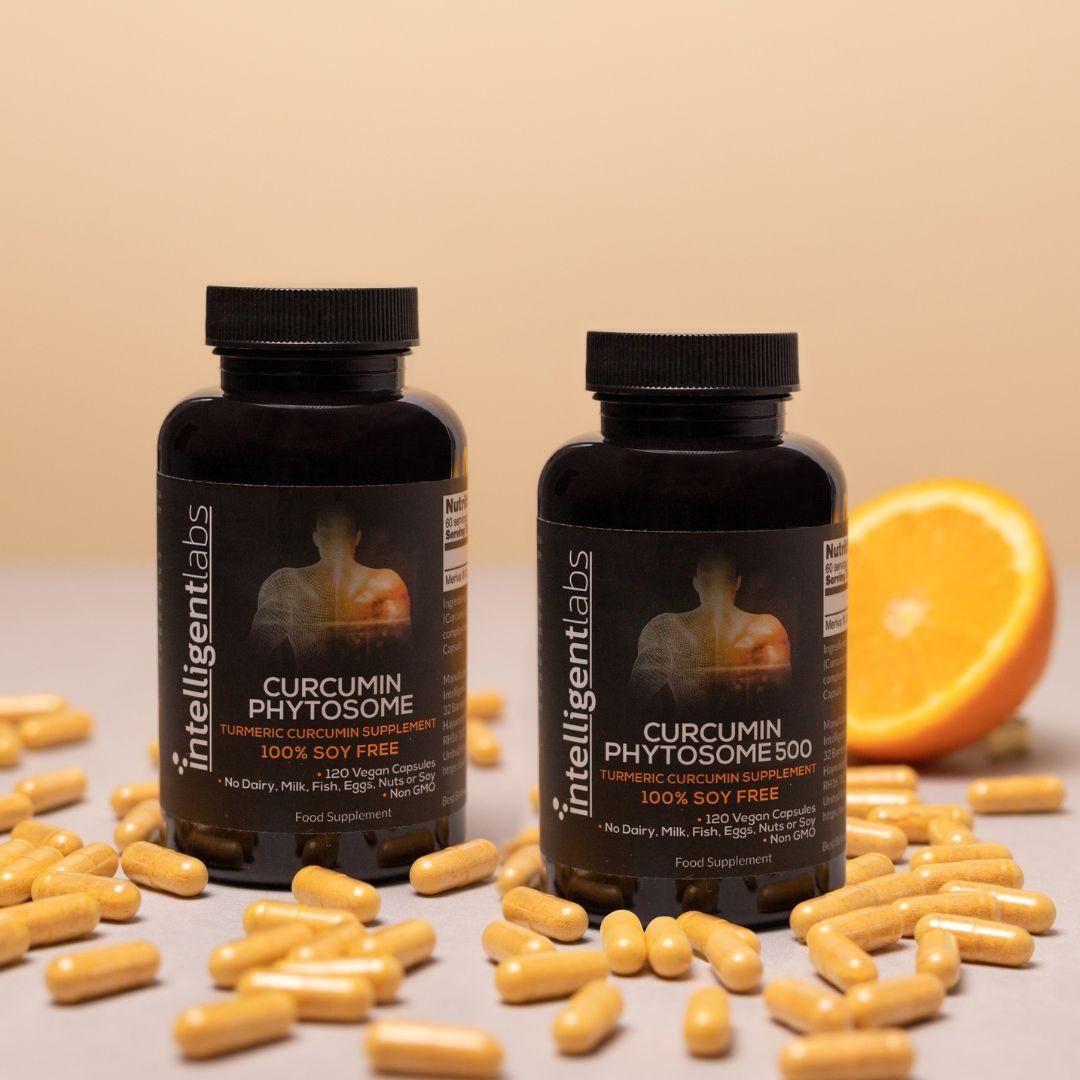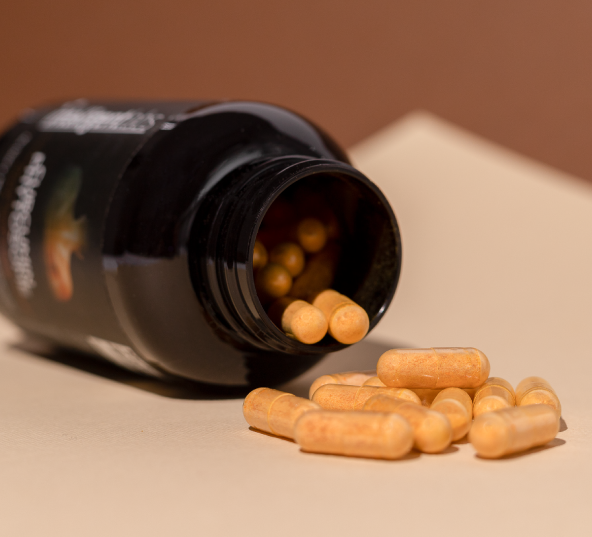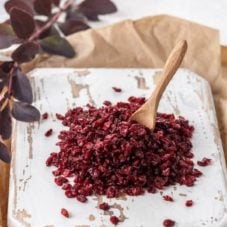Want to shake up your weight loss journey with something natural and spicy? Well, let’s talk about turmeric and its active compound, curcumin! This bright yellow spice, famous for giving curry its color, might just be the secret weapon you need to target stubborn belly fat and drop those extra pounds. So, grab a cup of turmeric tea, and read on to find out how this ancient spice can add some zest to your weight loss efforts!
Table of Contents
But first, what’s the difference between turmeric and curcumin?
Turmeric is a flowering plant from the ginger family, known scientifically as Curcuma longa. People have been grinding the root of this plant for millennia to produce the vibrant yellow powder that fills spice aisles and kitchens worldwide!
Curcumin, on the other hand, is the active compound found in turmeric. It’s what gives turmeric powder its distinctive color and impressive array of health benefits.1
But even with a long list of curcumin benefits, it makes up only about 3.14% of turmeric by weight. This means that, on average, 100g of turmeric powder contains just 3.14g of curcumin.2
Now, this turmeric vs. curcumin distinction is important because the health benefits of turmeric are often specifically linked to curcumin. This means that if you’re looking to lose weight, then taking curcumin is the way to go. How so?
Well, since turmeric contains only a small fraction of curcumin, you would need to consume large amounts of turmeric to get the same amount of curcumin typically found in a supplement. Additionally, the body absorbs ordinary curcumin very poorly.3
To improve bioavailability in our Curcumin Phytosome supplements, we use a patented nano-delivery system from Meriva®. Essentially, the curcumin is inserted into phospholipids (it’s the very same substance that makes up our cell membranes), so they are very well absorbed.
In fact, studies show that Meriva curcumin is up to 2900% better absorbed than ordinary curcumin,4 making it the optimal turmeric curcumin supplement for weight loss!

So, how exactly does turmeric (curcumin) help you lose weight?
As you will see below, turmeric offers a multi-pronged approach to weight loss.
1) Curcumin may suppress fat cell formation
There is evidence that curcumin might help stop fat cells from forming. In a study done on male Wistar rats fed with a high-fructose (sugar) diet, researchers reported that curcumin suppressed or blocked the production of new fat cells. This, in turn, effectively reduced the rats’ body fat, improved cholesterol levels, and helped them lose weight.5
2) Curcumin may promote fat burning
Both in vivo and in vitro studies show that curcumin may not only halt the growth of fat cells, it may also promote the breakdown of existing fat. Mice that were fed curcumin gained less weight and had lower fat levels, even without a decrease in food intake.
Moreover, curcumin also lowered cholesterol levels and affected genes linked to fat storage and production. These results suggest turmeric curcumin could be an effective weight loss supplement and fight against obesity.6
3) Curcumin is a potent anti-inflammatory
Obesity triggers an increase in inflammatory markers. This is linked to insulin resistance and higher levels of certain hormones. Conversely, the fat in lean individuals produces anti-inflammatory substances, indicating a protective role against obesity-related issues.7 8
The good news is that many studies have shown curcumin is a potent anti-inflammatory. It actively works against chronic inflammation in white fat tissue (this type of fat stores extra energy which can lead to obesity). Additionally, curcumin also boosts the production of adiponectin, a key anti-inflammatory hormone. 9
4) Curcumin may help promote insulin sensitivity
Insulin resistance, linked to weight gain, means cells do not respond to insulin, causing more fat storage.10
As mentioned in #3, curcumin promotes the production of adiponectin. Adiponectin isn’t just an anti-inflammatory hormone though. It also enhances insulin sensitivity and offers protection against diabetes and heart disease. Obese people often have low adiponectin.11
However, curcumin alone isn’t a complete solution to fight against insulin resistance. Eating a healthy diet, living an active lifestyle, and maintaining a healthy weight are all essential for sustained insulin sensitivity.12
5) Curcumin may increase bile production
Bile helps digest fats and fat-soluble vitamins and regulates metabolism, too. By helping with fat digestion, bile helps ensure that the body uses dietary fats efficiently for energy, rather than storing them as body fat.
Unfortunately, the amount and types of bile acids produced by people with obesity and type 2 diabetes are altered.13 Fortunately, curcumin is a choleretic agent and can stimulate the liver to increase bile production by about 62% as well as improve the bile acid composition.14
How much turmeric curcumin to take for weight loss?

While there is no official dosage recommendation for curcumin, we would suggest sticking to the suggested daily serving, which you’ll find on our product labels.
- For our Curcumin Phytosome 250, the daily serving will give you 500mg of curcumin.
- For our Curcumin Phytosome 500, one serving is equivalent to 1,000mg of curcumin per day.
Studies do show that curcumin has very low toxicity when taken orally. Even doses up to 12g/day have been noted to be safe. 15 16
That said, please do speak with your doctor before you start taking our supplement or if you intend to take more than our suggested serving size.
How to take the best turmeric supplement to optimize weight loss?
We would suggest taking our Curcumin Phytosome capsules with fat-containing meals to support your weight loss efforts. This is because eating fat stimulates bile production, allowing you to digest fats, including the phytosomes that contain our curcumin!
To conclude, can turmeric help you lose weight and burn belly fat?
The answer is yes. Turmeric can indeed support weight loss when taken as curcumin. However, due to curcumin’s low concentration in turmeric, supplements like our Curcumin Phytosome 250 and Curcumin Phytosome 500 may be more effective and give you faster results.
💬 Something on your mind? Share your thoughts in the comments. We love hearing from curious minds.
📩 And while you’re here, join our newsletter for more smart stuff (and secret perks)!
References:
- Prasad, Sahdeo, and Bharat B Aggarwal. “Turmeric, the Golden Spice.” Nih.gov, CRC Press/Taylor & Francis, 2011, www.ncbi.nlm.nih.gov/books/NBK92752/. ↩︎
- Tayyem, Reema F., et al. “Curcumin Content of Turmeric and Curry Powders.” Nutrition and Cancer, vol. 55, no. 2, July 2006, pp. 126–131, https://doi.org/10.1207/s15327914nc5502_2. ↩︎
- Anand, Preetha, et al. “Bioavailability of Curcumin: Problems and Promises.” Molecular Pharmaceutics, vol. 4, no. 6, 2007, pp. 807–18, www.ncbi.nlm.nih.gov/pubmed/17999464 ↩︎
- Cuomo, John, et al. “Comparative Absorption of a Standardized Curcuminoid Mixture and Its Lecithin Formulation.” Journal of Natural Products, vol. 74, no. 4, 25 Apr. 2011, pp. 664–669, https://doi.org/10.1021/np1007262 ↩︎
- Maithilikarpagaselvi, Nachimuthu, et al. “Curcumin Inhibits Hyperlipidemia and Hepatic Fat Accumulation in High-Fructose-Fed Male Wistar Rats.” Pharmaceutical Biology, vol. 54, no. 12, 30 May 2016, pp. 2857–2863, https://doi.org/10.1080/13880209.2016.1187179 ↩︎
- Ejaz, Asma, et al. “Curcumin Inhibits Adipogenesis in 3T3-L1 Adipocytes and Angiogenesis and Obesity in C57/BL Mice.” The Journal of Nutrition, vol. 139, no. 5, 18 Mar. 2009, pp. 919–925, https://doi.org/10.3945/jn.108.100966 ↩︎
- Ellulu, Mohammed S., et al. “Obesity and Inflammation: The Linking Mechanism and the Complications.” Archives of Medical Science, vol. 13, no. 4, 2017, pp. 851–863, https://doi.org/10.5114/aoms.2016.58928. ↩︎
- Khanna, Deepesh, et al. “Obesity: A Chronic Low-Grade Inflammation and Its Markers.” Cureus, vol. 14, no. 2, 28 Feb. 2022, https://doi.org/10.7759/cureus.22711. ↩︎
- Bradford, Peter G. “Curcumin and Obesity.” BioFactors (Oxford, England), vol. 39, no. 1, 1 Jan. 2013, pp. 78–87, https://doi.org/10.1002/biof.1074. ↩︎
- Verkouter, Inge, et al. “The Association between Adult Weight Gain and Insulin Resistance at Middle Age: Mediation by Visceral Fat and Liver Fat.” Journal of Clinical Medicine, vol. 8, no. 10, 28 Sept. 2019, https://doi.org/10.3390/jcm8101559. ↩︎
- Khoramipour, Kayvan, et al. “Adiponectin: Structure, Physiological Functions, Role in Diseases, and Effects of Nutrition.” Nutrients, vol. 13, no. 4, 2 Apr. 2021, p. 1180, https://doi.org/10.3390/nu13041180. ↩︎
- Clamp, L D, et al. “Enhanced Insulin Sensitivity in Successful, Long-Term Weight Loss Maintainers Compared with Matched Controls with No Weight Loss History.” Nutrition & Diabetes, vol. 7, no. 6, June 2017, pp. e282–e282, www.ncbi.nlm.nih.gov/pmc/articles/PMC5519190/ ↩︎
- Ma, Huijuan, and Mary Elizabeth Patti. “Bile Acids, Obesity, and the Metabolic Syndrome.” Best Practice & Research. Clinical Gastroenterology, vol. 28, no. 4, 1 Aug. 2014, pp. 573–583, www.ncbi.nlm.nih.gov/pmc/articles/PMC4159616 ↩︎
- Dulbecco, Pietro. “Therapeutic Potential of Curcumin in Digestive Diseases.” World Journal of Gastroenterology, vol. 19, no. 48, 2013, p. 9256, https://doi.org/10.3748/wjg.v19.i48.9256. ↩︎
- Belcaro, Gianni, et al. “Efficacy and Safety of Meriva®, a Curcumin-Phosphatidylcholine Complex, during Extended Administration in Osteoarthritis Patients.” Alternative Medicine Review: A Journal of Clinical Therapeutic, vol. 15, no. 4, 1 Dec. 2010, pp. 337–344, pubmed.ncbi.nlm.nih.gov/21194249/. ↩︎
- Lao, Christopher D, et al. “Dose Escalation of a Curcuminoid Formulation.” BMC Complementary and Alternative Medicine, vol. 6, no. 1, 17 Mar. 2006, https://doi.org/10.1186/1472-6882-6-10. ↩︎




